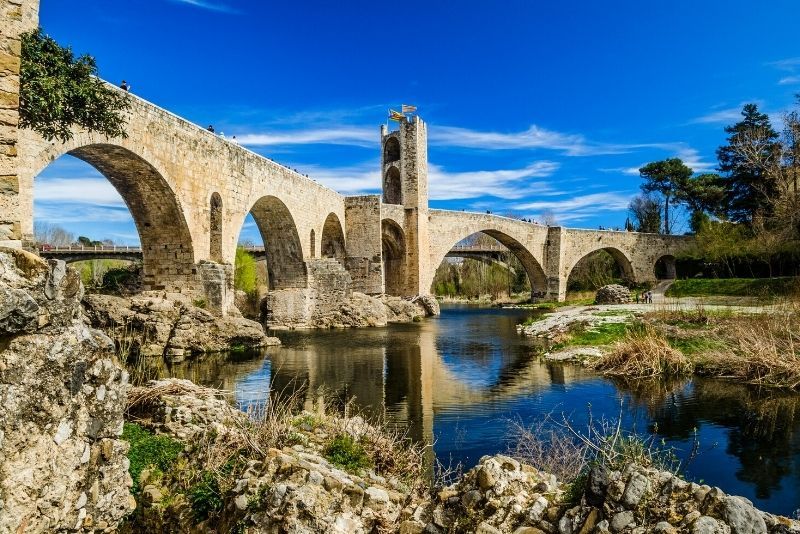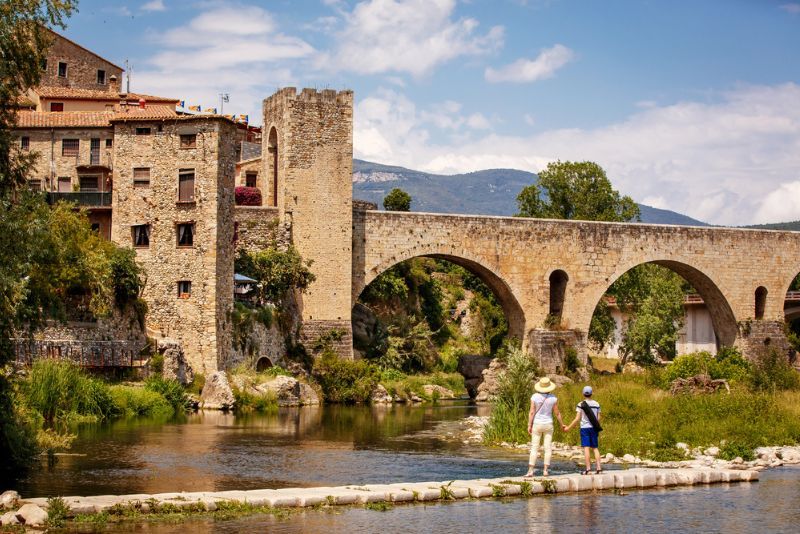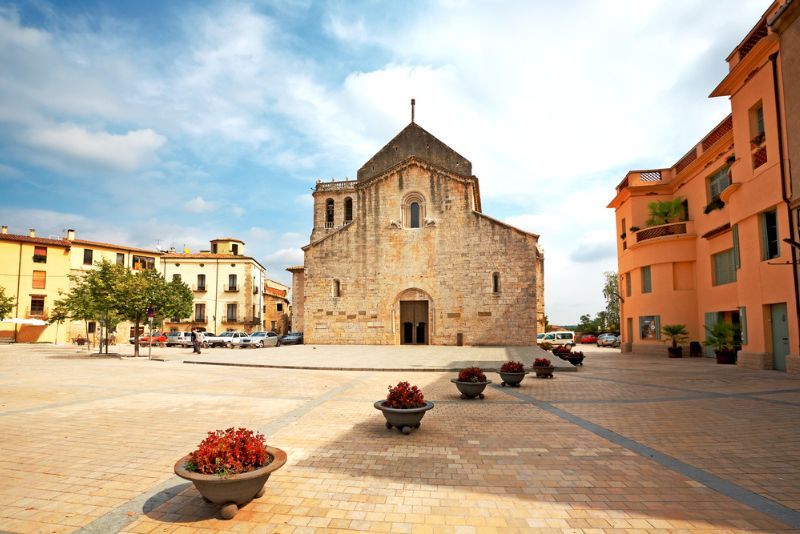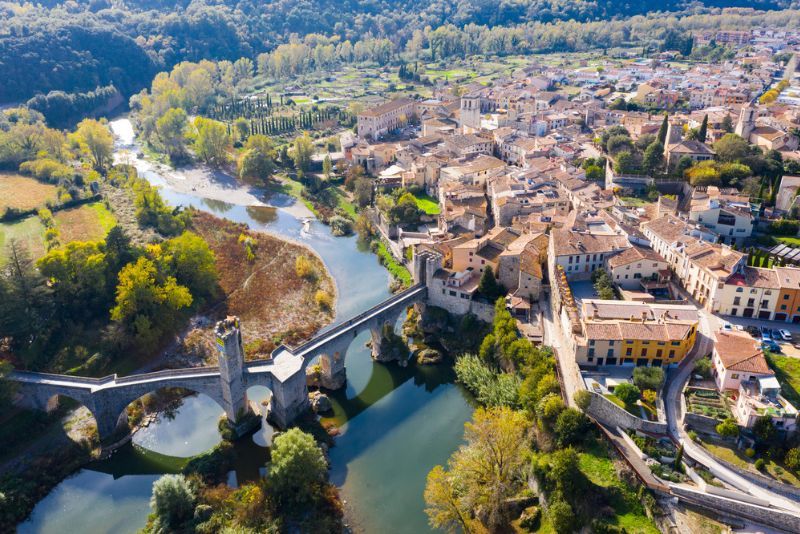Besalú: Day Trips and Tours from Barcelona
As a prime example of a medieval town, Besalú is one of Catalonia’s most impressive historic gems. Situated in the unique La Garrotxa region, its cobbled streets, facades and famous old bridge draw visitors from far and wide.
Embark on a Besalú day tour from Barcelona to explore the region's rich heritage and discover its Romanesque, medieval and Jewish influences. Also taste some of the best of local cuisine in one of Besalú’s pleasant restaurants.
As a prime example of a medieval town, Besalú is one of Catalonia’s most impressive historic gems. Situated in the unique La Garrotxa region, its cobbled streets, facades and famous old bridge draw visitors from far and wide.
Embark on a Besalú day tour from Barcelona to explore the region's rich heritage and discover its Romanesque, medieval and Jewish influences. Also taste some of the best of local cuisine in one of Besalú’s pleasant restaurants.

(0/24) checking Musement...
As a prime example of a medieval town, Besalú is one of Catalonia’s most impressive historic gems. Situated in the unique La Garrotxa region, its cobbled streets, facades and famous old bridge draw visitors from far and wide.
Embark on a Besalú day tour from Barcelona to explore the region's rich heritage and discover its Romanesque, medieval and Jewish influences. Also taste some of the best of local cuisine in one of Besalú’s pleasant restaurants.

Discover more with our visitor's guide to Besalú, one of the most captivating day trips from Barcelona.
What is the best way to get to Besalú from Barcelona?
Besalú lies in the comarca of La Garrotxa and is easy to reach as a day trip from Barcelona by car or public transportation. Besalú is about 133 kilometers away from Barcelona, with the drive taking about 1.5 hours.
From the Barcelona - Gran Via station, you can hop on the 658 bus to Besalú, which takes 1 hour and 40 minutes. If travelling by train, the closest stations are in Vic and Girona, where you must then take a car or taxi to Besalú.
To avoid the hassle of driving out there yourself or relying on public transportation, there are several guided day tours departing from Barcelona.
What is the typical itinerary of a day tour to Besalú from Barcelona?
After pickup in Barcelona, you will visit medieval Vic and see the Plaça Major, Vic’s biggest square. You’ll also visit the old town hall, Casa Comella, and the Roman Catholic Cathedral of Peter the Apostle. Leaving Vic, pass by the medieval village of Castellfollit de la Roca, built on a 40-meter-high cliff.
A highlight is the Volcanic Zone Natural Park of La Garrotxa, containing more than 40 volcanoes and dense beech and oak forests. Also visit the medieval town of Santa Pau in the heart of the volcanic zone. Stop at Rupit, a charming town with well-preserved old stone houses.
After lunch, continue to the Cingles de Tavertet nature area above the Sau Valley. Admire the scenic forests inhabited by birds of prey and views of the Sau reservoir and Montseny Mountains.
Finish your tour in medieval Besalú, with its Old Bridge, the churches of Sant Pere, Santa María and Sant Vicenç, as well as Jewish medieval baths. Also see the 10th century castle on the hilltop. From Besalú, you’ll be returned to your hotel in Barcelona.
What kinds of tours to Besalú can you choose from?
Besalú and 3 medieval towns tour with hotel pick-up
Explore several medieval villages of Catalonia in a single day on a guided tour to Besalú from Barcelona. During this walking tour of Vic, Santa Pau and Besalú, you will learn the history of these Catalan jewels. Visit Roman temples, cathedrals, town squares and old bridges and share fascinating historical facts about these landmarks.
After your hotel pickup, you will visit historic Vic and get immersed in its medieval atmosphere. Pass by the Plaça Major, Vic’s biggest square and old town hall, Casa Comella. Look at the Cathedral, the Spanish Catholic temple and take the time to indulge in the famed Catalan cuisine.
From Vic, pass by the little medieval village of Castellfollit de la Roca, built on a 40-meter-high cliff. Along your way, enjoy Santa Pau, situated in the heart of the volcanic zone. It’s a small, medieval village with Gothic and Renaissance architectural features in a pleasant, green environment.
Conclude your tour in charming Besalú, a very well-preserved medieval town. Walk through its narrow streets to the town center and learn about the Jewish influence during the Middle Ages. See the 10th century castle, erected on top of a hill, and enjoy the beautiful views.

Besalú, Rupit and Vic private tour
Explore the medieval villages of Besalú, Rupit and Vic, the Garrotxa Volcanic Natural Park and Cingles de Tavertet nature area on this small-group tour from Barcelona. See the villages’ old bridges, churches, baths and stone houses, the lovely forests of the natural parks, and the Sau reservoir and Montseny Mountains.
Head directly to the meeting point, or request pickup in Barcelona in an air-conditioned vehicle. Your first stop is at the old Bridge of Besalú, built in the 11th and rebuilt in the 14th century. Visit the ecclesiastical landmarks such as the churches of Sant Pere, Santa María and Sant Vicenç, as well as the medieval baths in the Jewish quarter.
Next, stop at the Garrotxa Volcanic Natural Park, with its more than 40 volcanoes and thick forests of beech, oak and holm oak. After a walk through the area, have a free meal in the medieval town of Santa Pau in the park. Stop at Rupit, a charming town with very well-preserved old stone houses from the 16th and 17th centuries.
From here, leave for Cingles de Tavertet, a natural area rising above the valley of Sau and the d'Osona. You will find great scenic forests inhabited by birds of prey and views of the Sau reservoir and Montseny mountains.
How much does a tour to Besalú from Barcelona typically cost?
Most private and guided tours last 10 hours, while private tours to Besalú cost around €270 per person.
The Besalú and 3 medieval towns tour with hotel pick-up costs €100 per person and the Besalú, Rupit and Vic private tour €250 per person.
A 9-hour private tour per group up to 4 costs €700 and a 10-hour private tour per group up to 7 costs €1340. Both tours include Girona in the itinerary.
What will you see and do in Besalú?
The Medieval Bridge
When visiting Besalú, the first landmark you’ll find is the impressive medieval bridge across the Fluvia River leading into the old town. It was built in the 12th century, with seven arches and two towers. During the Middle Ages, horsemen and pedestrians crossing the bridge had to pay a toll in diner or òbol.
The first bridge was swept away by a flash flood in 1315, before being rebuilt. The bridge has, in fact, been rebuilt several times over the centuries. During the Spanish Civil War (1936-1939) it was blown up, but rebuilt in the 1950s-1960s.
The Monastery of Sant Pere

Most of the monastery of Sant Pere does not exist anymore, but the church that belonged to it is still there. The Benedictine order monastery was founded in 977, but most of the church building dates from the 11th century.
The church itself is quite large and was built in a basilica style with three naves, a large central apse and decorative features. Entrance to the church is free. It is located in the middle of a Sant Pere square, which also features Casa Comella from 1896.
Jewish Baths and Synagogue
Jewish people have settled in Besalú as early as the 9th century, thus it has an important Jewish heritage. Some interesting sites relating to Jewish history have remained, of which a most important discovery was the 12th century Jewish baths.
Found during excavations in 1964, they can be seen near the medieval bridge at the town entrance. The baths are located underground and are well-preserved and open to visitors.
What's the best time of year to visit Besalú?

The best time to visit Besalú is during the months of May, and September to October when you will experience good weather with pleasant average temperatures.
Travel tips
- Make sure to book your tour to Besalú from Barcelona in advance.
- Besalú holds festivals throughout the year. Some of the more popular festivals are the Jewish Festival (March), the Medieval Festival (September) and Ratafia Fair (November).
- Besalú is known for its traditional Catalan cuisine, so be sure to try local dishes such as pa amb tomàquet (bread with tomato), escalivada (grilled vegetables), and crema catalana (Catalan cream).

